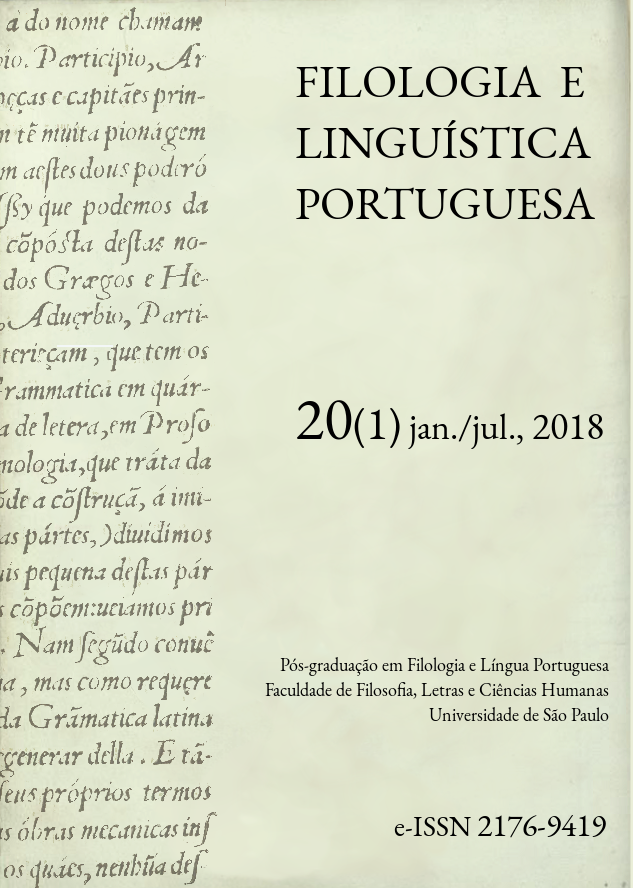The emerging rizotonic participles in Brazilian Portuguese and its historical genesis
DOI:
https://doi.org/10.11606/issn.2176-9419.v20i1p47-59Keywords:
Historical linguistics, Rhizotonic participles, Erudite derivation, Intensive verbs, Analytic passiveAbstract
This work aims to investigate the historical formation of emergent rhizotonic participles in Brazilian Portuguese (such as: “tinha falo, tinha compro, tinha chego, tinha perco, tinha trago, tinha escrevo, tinha faço,” among others), from two basic questions: where does the positive social and/or stylistic evaluation for rhizotonic forms (not only the emergent ones, but all of them) come from; and how this emergent variant appears apparently mirrored in the form of the first person of the present indicative. Regarding the first question, the work suggests that the beginning of the prestigious valorization of the rhizotonic forms is correlated to the processes of erudite derivation intensified during the period of “classic Portuguese,” around the fifteenth and sixteenth centuries. As for the second question, the data suggest that this variant appears in medieval Romance, from - among other processes - verbs with an intensive aspect, which from the fourth century onwards had their employment restricted to analytical passive constructions.
Downloads
References
Albright A. Islands of reliability for regular morphology: evidence from Italian. Language. 2002;78(4):684-709.
Almeida L, editor. Obras dos Príncipes de Avis: Livro da Montaria, Leal Conselheiro, Livro da Ensinança de Bem Cavalgar Toda Sela, O Livro da Virtuosa Benfeitoria, Livro dos Ofícios. Introd. e revisão de Lopes de Almeida. Porto: Lello & Irmão Editores; 1981.
Aronoff M. Morphology by itself: stems and inflectional classes. Cambridge, Massachusetts: Massachusetts Institute of Technology Press; 1994.
Baerman M, Brown D, Corbett GG. The syntax-morphology interface: a study of syncretism. Cambridge: Cambridge University Press; 2005.
Baldi P. Remarks on the latin R-form verbs. Zeitschrift fur vergleichende Sprachforschung. 1975;90(1):222-57.
Ferrari Neto J, Silva CRT, Fortes F. A interpretação passiva/indeterminada de construções com a partícula se. DLCV, 2010,jan./jun.;7(1):39-56.
Halle M, Marantz A. Distributed morphology and the pieces of inflection. In: Hale K, Keyser SJ, editores. The view from building 20: essays in linguistics in honor of Sylvain Bromberger. Cambridge, MA: MIT Press; 1993.
Harris-Northall R. The Old Spanish participle in -udo: its origin, use, and loss. Hispanic Review, 1996, winter;64(1):31-56.
Huber J. Gramática do português antigo. Trad. de Maria Manuela Gouveia Delille. Lisboa: Fundação Calouste Gulbenkian; 1986[1933].
Ilari R. Linguística Românica. 2ª ed. São Paulo: Ática; 1997.
Laurent R. Past participles from Latin to Romance. Oakland: University of California Press; 1999.
Mattoso Câmara Júnior JM. História e estrutura da língua portuguesa. Rio de Janeiro: Padrão; 1975.
Miara FLJ. Particípios duplos: usos, desusos e alguns “intrusos”. Florianópolis: Universidade Federal de Santa Catarina; 2013.
Miara FLJ, Coelho IL. Particípios duplos: norma, avaliação e uso escrito. Cadernos de Letras da UFF. 2016,jan.;25(51). [citado 09 mai. 2018]. Disponível em: http://www.cadernosdeletras.uff.br/index.php/cadernosdeletras/article/view/224.
Neves G. A voz passiva no latim vulgar. Ciberdúvidas da língua portuguesa, 10 dez. 2014. [citado 26 mar. 2015]. Disponível em: http://www.ciberduvidas.com/pergunta.php?id=32908.
Nunes J. Se apassivador e se indeterminador: o percurso diacrônico no português brasileiro. Cadernos de Estudos Linguísticos. 1991,jan./jun.;20(1):33-58.
Pinkster H. Oxford Latin syntax, volume 1: the simple clause. Oxford: OUP Oxford; 2015.
Posner R. The romance languages. Cambridge: Cambridge University Press; 1996.
Queriquelli LH. Permanências e reincidências latinas do português brasileiro: uma proposta de ensino de latim via linguística histórica. Florianópolis: Universidade Federal de Santa Catarina; 2016.
Souza PC. Particípios atemáticos no PB: um processo paradigmático. ReVEL. 2011; esp.ed.(5):1-30. [citado 25 ago. 2015]. Disponível em: http://www.revel.inf.br/files/artigos/revel_esp_5_participios_atematicos_no_pb.pdf.
Downloads
Published
Issue
Section
License
Copyright is transferred to the journal for the online publication, with free access, and for the printing in paper documents. Copyright may be preserved for authors who wish to republish their work in collections.



















